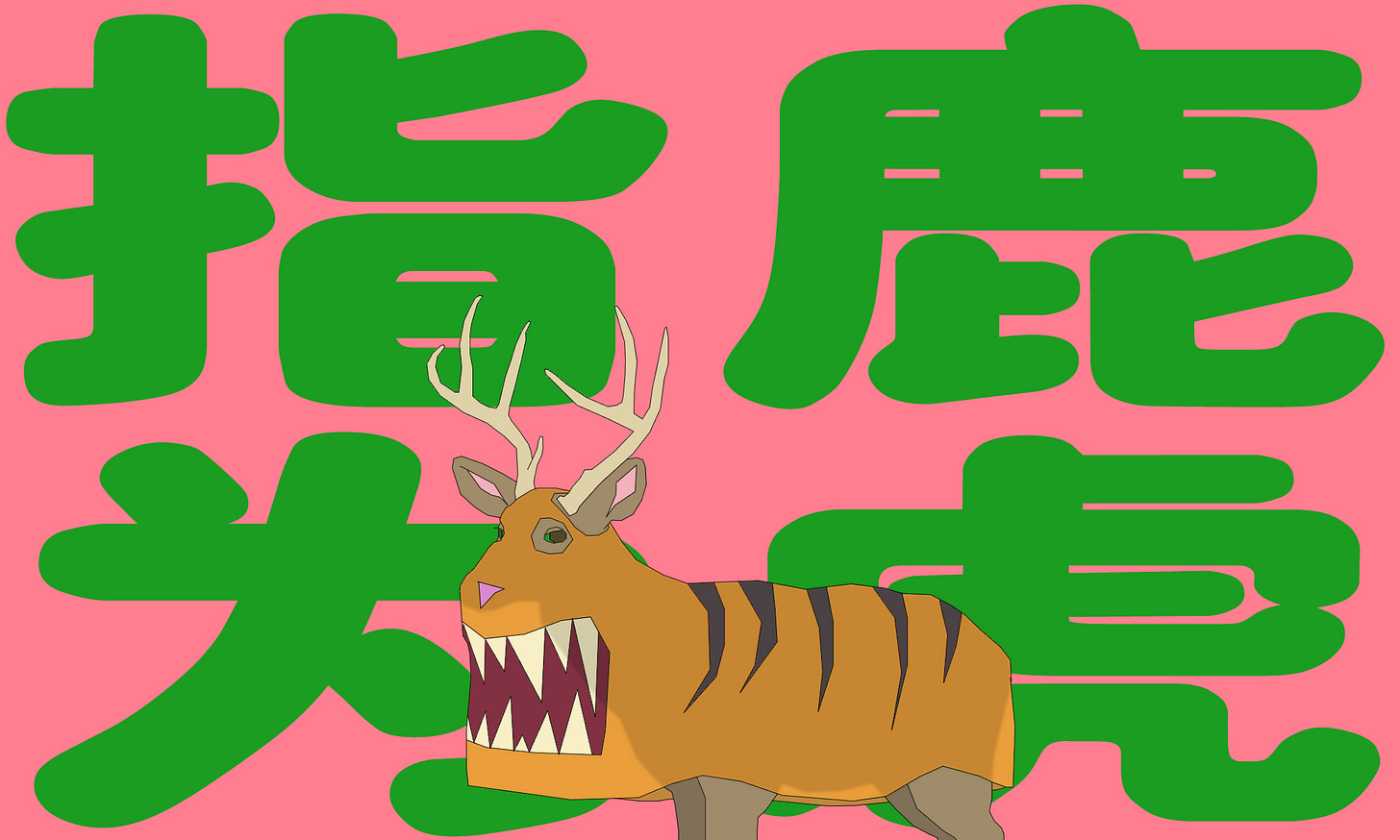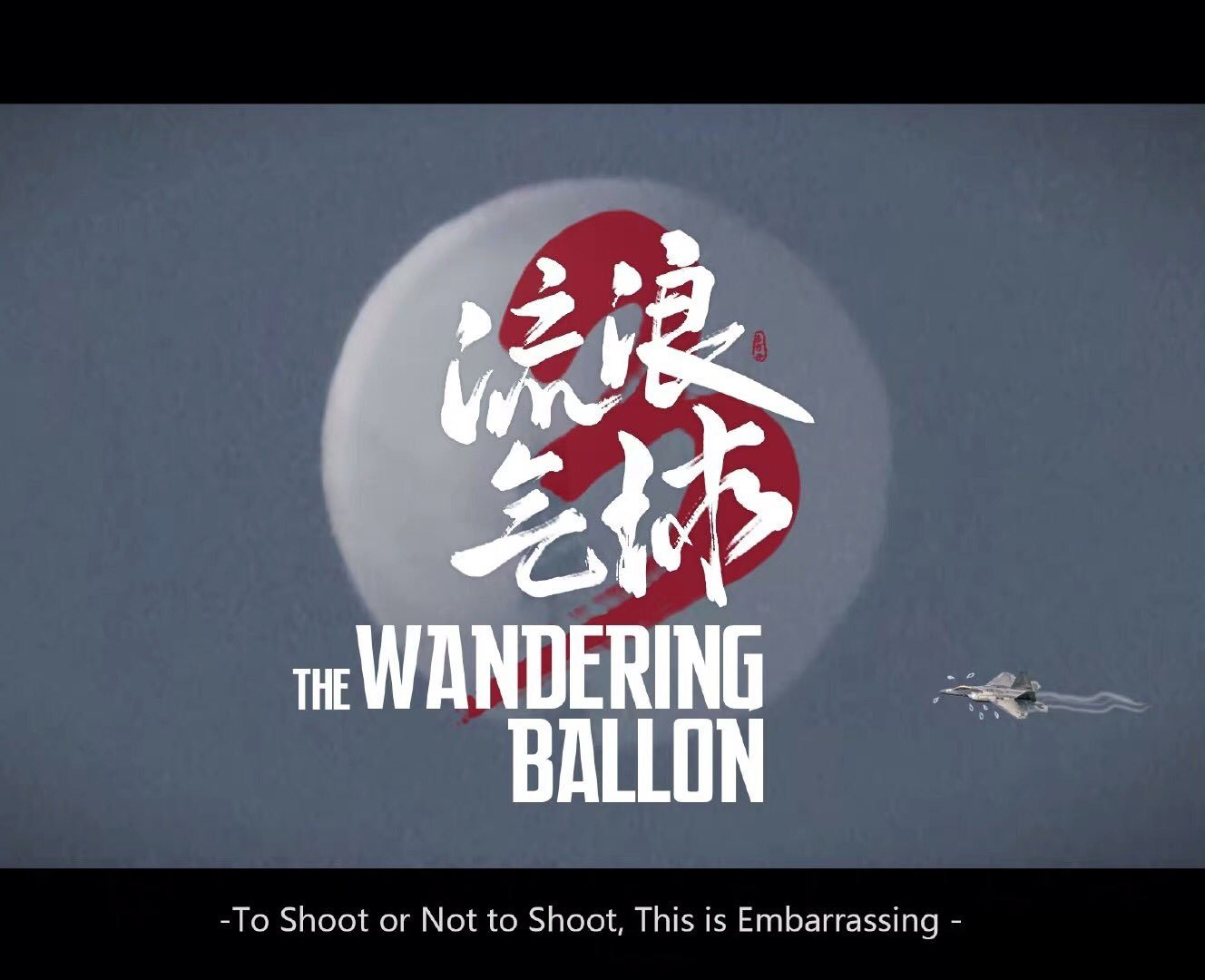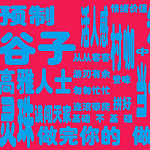Welcome to RealTime Mandarin—a multimedia resource to immerse you in the latest Chinese language trends, inspire you to practice and improve your Mandarin every week, and empower you to communicate with confidence.
Subscribe now to get the next issue straight to your inbox!
The "Wandering Balloon incident" (流浪气球事件 liúlàng qìqiú shìjiàn) dominated news, newsletters, and Tweets in the China watching world all week.
I thought about scrapping the idea to write about it. But then I found this sentence which translates into superb Chinglish:
“Wandering Balloon” and the faces of US sentient beings: The Republican Party "pointed at a deer as a tiger"; The Democratic Party "saved respect overnight".
“流浪气球”与美国众生相:共和党“指鹿为虎”,民主党“连夜挽尊”
Decision made! There's enough in here to take an entire newsletter to explain!
The arrival of the Chinese balloon in US airspace coincided with the screening of the Chinese blockbuster sci-fi Wandering Earth 2 (流浪地球 liúlàng dìqiú) in American cinemas, as one internet commentator noted:
As the Chinese people are hotly discussing Wandering Earth 2, Americans are talking about the Wandering Balloon.
中国人在热议流浪地球美国人在热议流浪气球
Metaphors of movies and performances flow through discussions, a nod to the ‘real life’ Wandering Balloon blockbuster unfolding.
The language used by officials in the US and China to describe the balloon is totally different. It's a "spy balloon" (间谍气球 jiàndié qìqiú) to the Americans; it's an "unmanned civilian airship" (民用无人飞艇 mínyòng wúrén fēitǐng) in Chinese press briefings.
But how commentators talked about it on both sides of the firewall and of the debate is similar: Dropping idioms like "taking things too far" (煞有介事), "turning trivial matters into major issues" (小题大做), and “seeing the enemy at every turn” (草木皆兵).
So this week’s linguistic wanderings take us on a journey through how the Wandering Balloon is being discussed in the Chinese language media inside and outside of China.
Favourite Five
1. 挽尊 wǎn zūn
save face
共和党“指鹿为虎”,民主党“连夜挽尊” - The Republican Party "pointed at a deer as a tiger". The Democratic Party could only follow suit in order to save face. [3]
Note: Internet slang meaning to ‘get one’s respect back’ after losing face.
2. 大戏 dà xì
grand show
一部由美国政客导演的“流浪气球”大戏也在美国上演 - The grand show of “Wandering Balloon” orchestrated by American politicians is also taking place in the US. [2]
Related: 表演 biǎo yǎn - performance (negative connotation)
3. 朝野 cháo yě
the government and the opposition party
这架无辜的偏航无人飞艇成为了美国朝野恶斗的靶子 - This unmanned airship that was helplessly blown off course is caught in the crossfire of the ugly political struggle in the US. [3]
4. 草木皆兵 cǎo mù jiē bīng
every bush and tree looks like an enemy, paranoid
现在美国人对中国真的是草木皆兵了 - Tensions are very high in the US about China. [5]
Related: We discussed this before in October last year. It's part of a longer phrase: 风声鹤唳,草木皆兵 fēng shēng hè lì, cǎo mù jiē bīng.
5. 指鹿为虎 zhǐ lù wéi hǔ
pointing at a deer and calling it a tiger
“流浪气球”与美国众生相:共和党“指鹿为虎”,民主党“连夜挽尊” - How the “Wandering Balloon” has been interpreted in the US: The Republican Party "pointing at a deer and calling it a tiger". The Democratic Party could only follow suit. [3]
More: We discuss this more in The China Project Phrase of the Week. This is a newly coined idiom from the original 指鹿为马 - “pointing at a deer and calling it horse”, which means to distort the facts.
Consuming the Conversation
Useful words
6. 谬 miù
wrong
绝不是美方谬称的所谓“间谍飞行器” - This is absolutely not what the US alleges: a “spy balloon”. [3]
Related:
荒谬 huāng miù - absurd
谬误 miù wù - mistake (formal, literary)
7. 互疑 hù yí
mutual distrust
这种战略互疑的强化使得双方看对方的每一步动作都觉得不怀好意 - The increasing mutual strategic distrust makes both sides feel hostile to each other's every move. [1]
Related: 互信 hù xìn - mutual trust
8. 闹剧 nào jù
farce
前者讲述了地球危机下人类的团结自救,而后者则是令人啼笑皆非的闹剧 - The former is about bringing mankind together in the face of a crisis, while the latter is a laughable farce. [2]
Note: Carrying on with the cinema metaphor.
9. 外溢 wài yì
overflow into; spill over
美国两党恶斗的外溢效应已经严重影响了美国的外交政策制定 - The spillover of the vicious struggle between the two parties in the United States has seriously affected its foreign policy. [3]
10. 恶斗 è dòu
ugly fight
这是美国民主共和两党新一轮恶斗,是一次典型带有政党色彩的舆论文宣战 - This latest round of fierce struggle between the Democratic and Republican parties in the United States is a typical act of propaganda that aims to sway the public opinion in their favour. [3]
11. 栽赃 zāi zāng
to set sb up, to frame sb
美国两党相互攻击的格局决定了一定要拔高事情的意义,使栽赃和强硬占上风 - The pattern of mutual attacks between the two parties in the United States determines that the significance of the matter must be exaggerated, so that framing and toughness will prevail. [4]
Three-character phrases
12. 众生相 zhòng shēng xiàng
sentient beings; all the people
“流浪气球”与美国众生相:共和党“指鹿为虎”,民主党“连夜挽尊” - How the “Wandering Balloon” has been interpreted in the US: The Republican Party "pointed at a deer as a tiger". The Democratic Party could only follow suit. [3]
More: This is a Buddhist term meaning sentient beings, or gods. In contemporary Chinese it can also mean "ordinary people", here it’s referring to the political parties.
13. 犯不着 fàn bu zháo
not worth it















